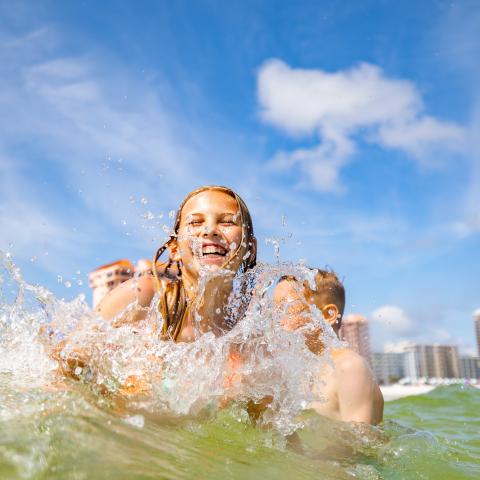Watch Visual Stories
Helpful Tips & Knowledge About Alabama's Beaches
Share the Beach
Share the Beach was founded by the Alabama Coastal Foundation in 2005 and is Alabama's sea turtle conservation program that works to protect sea turtles and their nests. It follows the US Fish and Wildlife Service's protocols under the endangered species recovery permit. Volunteers patrol the beach, educate the public and school groups, conduct late-night observations, and assist with supply and equipment preparations. These efforts help ensure the protection of sea turtles.
Help Local Wildlife on Alabama's Beaches
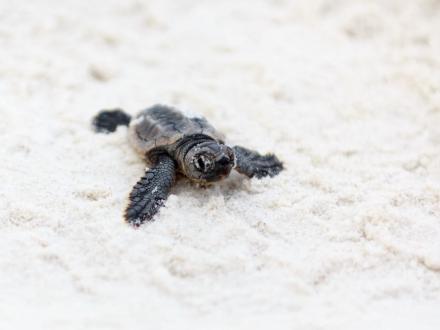
Do Not Disturb Sea Turtles or Nests
Do Not Disturb Sea Turtles or Nests
Sea turtles visit our beaches every year to nest from May through October. In order to protect these turtles, a local program, Share the Beach, was established to advocate for their livelihood and habitat. If you encounter a sea turtle nest while on our beaches, keep your distance, don't bother it, and don't shine flashlights at it. To report a nest or nesting turtle, contact the Sea Turtle Hotline at 1-866-Sea-Turtle (1-866-732-8878). It is a federal crime to disturb sea turtles or their nests, and doing so can result in up to $15,000 in fines.
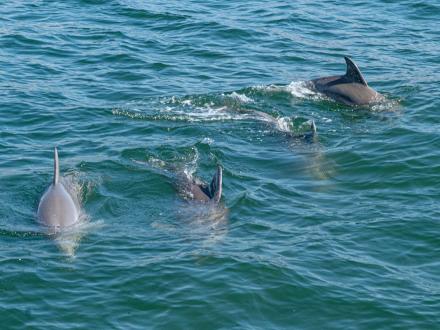
Do Not Disturb Marine Wildlife
Do Not Disturb Marine Wildlife
If you spot marine life in the wild, it’s important to realize that human contact can cause trauma and disrupt their natural behaviors. Stay at least 50 yards from these animals and move slowly away if they show signs of disturbance. Refrain from feeding, touching or swimming with wild marine life, and don’t forget to put your boat’s engine in neutral when they are nearby. Don't worry. Snapping a few pictures from a safe distance won't disturb them!

Watch Out for Shorebirds
Watch Out for Shorebirds
Turtles aren't the only creatures who use our beaches as nesting grounds. Every March through September, birds such as Snowy Plovers, Least Terns, and Black Skimmers nest on Alabama's Beaches. Because they nest on the ground their eggs and chicks are vulnerable to predators, weather events, and human disturbance. You can help these birds by keeping an eye out for, and staying out of, posted nesting areas when walking on the beach. Shorebirds' nests blend in with the sand and may be easily stepped on. Never attempt to move a nest or chicks. It is best practice to not scare away adult nesting birds. Under the Migratory Bird Treaty act it is a federal crime to take, harm, or harass nesting shorebirds and is punishable with fines up to $100,00.
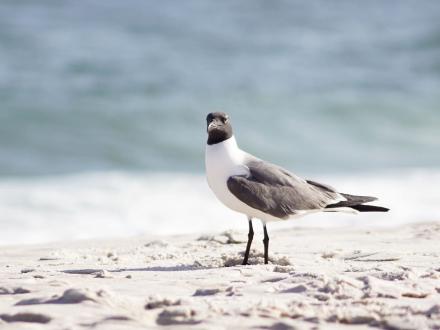
Do Not Feed The Seagulls
Do Not Feed The Seagulls
Keep wildlife wild! Coastal wildlife, such as seagulls, may beg for your food but it is not good for their health to feed them human food. Human food is not a part of these animals' natural diets and can cause them serious issues. Feeding wildlife, such as seagulls, teaches them not to fear humans which can cause them to become aggressive. Excess leftover food on our beaches can also attract unnecessary predators to the area of nesting birds and sea turtles.
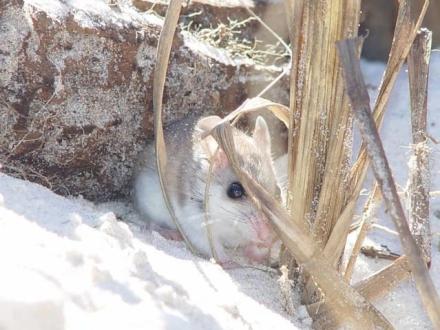
Don't Walk on Sand Dunes
Don't Walk on Sand Dunes
Sand dunes play an essential role in our coastal ecosystem, and we have the local Alabama beach mice to thank for helping us keep our dune systems healthy. These tiny creatures weigh less than one pound but play a big impact. They burrow in the sand during the day but scurry around at night, collecting and distributing sea oats and beach grass seeds across the dunes. These seeds grow into plants that help stabilize the dunes and protect them against harsh weather. You can help protect both the sand dunes and the endangered Alabama beach mice by not walking on or disturbing the dunes.
Leave Only Footprints
Around fifteen years ago, community leaders realized we had a serious problem. The sea turtles weren’t nesting like they used to and the harmony of our local sea life and wildlife were imbalanced. We were met with a challenge on how to balance beach fun for people with a healthy ecosystem for wildlife. Together, our two communities, area business and concerned citizens organized in 2007 to create a beach sustainability program to protect our valuable natural assets. In 2015, the Beach Litter program was added to further protect the health and safety of the beach, surrounding waters, animals and, of course, beachgoers. Below are the beach rules and regulations established to help protect & maintain Alabama's Beaches.
How to Keep Our Beaches Healthy
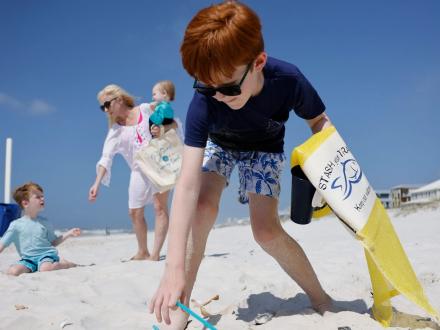
Recycle
Recycle
Recycle when possible and use reusable products such as grocery bags and water bottles. This is an easy way for you to help keep our community healthy. The less garbage that goes into landfills, the better.
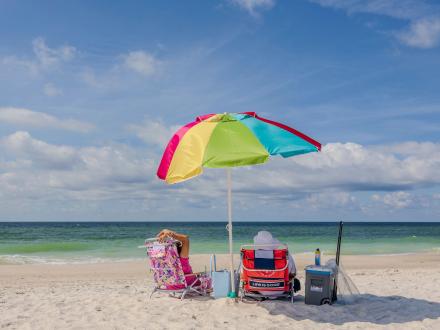
Remove All Belongings From the Beach Each Day
Remove All Belongings From the Beach Each Day
Leave only footprints on the beach by removing all belongings, including toys, chairs, tents, coolers and blankets, by sunset each day. This prevents them from being swept into the water and keeps our beaches clear for nesting sea turtles and rescue personnel. Please note that any items left on the beach before sunrise or after sunset will be discarded by beach patrol.

Keep Pets Off The Beach
Keep Pets Off The Beach
While pets are welcome at many places, they are prohibited from our public beaches. If you want to bring your four-legged friend along to your vacation adventures, check out all of the pet-friendly spots in the area.
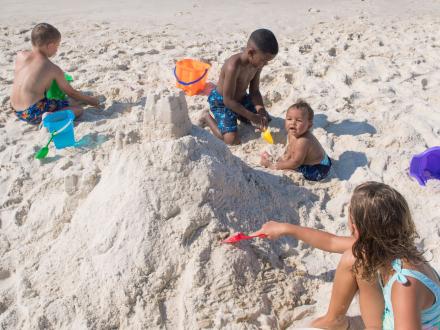
Do Not Dig Large Holes in Sand
Do Not Dig Large Holes in Sand
If you dig a hole, fill it before you leave the beach. Holes are hazardous, particularly to sea turtles, nesting baby birds, and humans. Large holes also become a hazard to our first responders during rescues. Any holes dug on Alabama's Beaches must not exceed 12 inches deep.
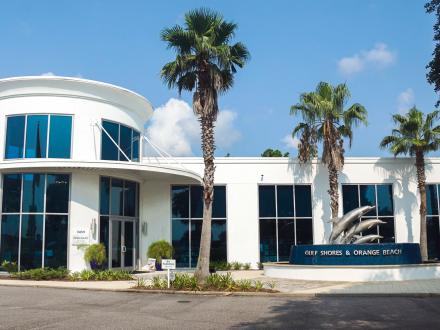
Avoid Using Bright Lights at Night
Avoid Using Bright Lights at Night
Avoid flashlights or flash photography at night, as the light can disorient the turtles. Stop by one of our Welcome Centers to get stickers to cover your phone flashlight or hand-held flashlight.
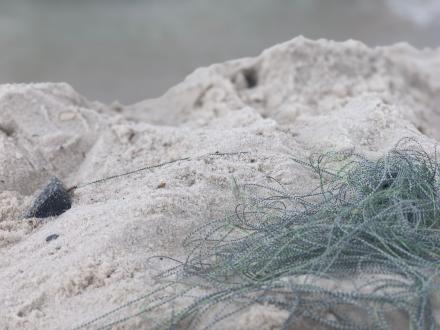
Practice Responsible Fishing
Practice Responsible Fishing
Improperly discarded fishing gear is a danger to underwater habitats, marine life, coastal birds, and land animals. Remember to clean up any leftover lures, hooks, and line from the shore and from fish before releasing them. Additionally, it is illegal to discharge fuel, oil, or any other petroleum products into the water or use detergents or soaps to break up any spills. If you hook or entangle a bird while fishing, use this quick guide on how to safely handle the situation for you and the bird.
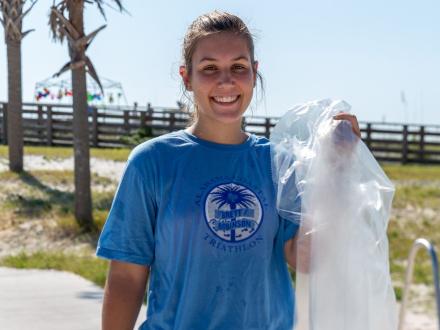
Volunteer at the Alabama Coastal Cleanup
Volunteer at the Alabama Coastal Cleanup
Each year, thousands of volunteers gather across the Alabama Gulf Coast to participate in the Annual Alabama Coastal Cleanup, where they clean up trash from waterways, neighborhoods, streets, and storm drains. This one-day event is the largest annual volunteer event in the state and greatly impacts our coastal communities. Cleaning litter benefits local wildlife, residents and visitors, and our gorgeous Gulf. This year’s event is Saturday, September 20, from 8 am to 12 pm. Find a cleanup zone near you and sign up to help protect and preserve our ecosystems!
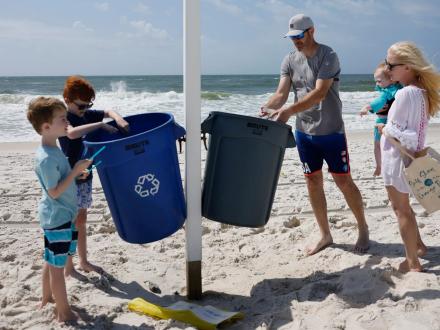
Teach Kids About Beach Conservation
Teach Kids About Beach Conservation
There is no better time to teach children the importance of recycling and picking up after themselves than at the beach. When exploring Alabama's Beaches for seashells, bring an extra bag to collect any litter you may find along your way. And, if you happen to stumble upon marine life or driftwood, take the time to be in awe of their beauty, but take a picture and leave it in its home.
Ecotourism in Gulf Shores & Orange Beach

Gulf Shores and Orange Beach remains a beautiful and fun destination for tourists and residents alike as a result of continued sustainability and ecotourism initiatives.





